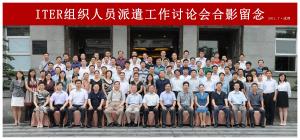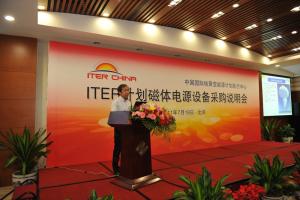China to nurture "fusion talent"
A symposium on the recruitment of Chinese staff at ITER was held by the China International Nuclear Fusion Energy Program Execution Center, the Chinese Domestic Agency, on 5 July. More than 100 representatives from about 40 departments, organizations and companies attended the meeting, including the Ministry of Science and Technology, the Chinese Academy of Sciences, the China National Nuclear Corporation, as well as universities, institutes and potential suppliers.
Deputy Director-General Luo Delong gave a keynote speech that presented a comprehensive overview of the international and domestic situation of ITER. Luo stressed that the successful implementation of the ITER Project required joint effort from all participants, and he stated that the education and training of experts in magnetic confinement was one of the top priorities.
Academician Wan Yuanxi, the chief engineer of the EAST Tokamak, dean of the School of Nuclear Science and Technology at the University of Science and Technology of China and chair of the ITER Scientific and Technical Advisory Committee (STAC), then gave a presentation on the overall technical progress of the ITER project regarding schedule, budget and cost, project management and technical integration.
Wang Hang from ITER's Human Resources Division gave a detailed explanation of the recruitment procedures, and the salaries and benefits for directly-employed staff and other kinds of personnel. Wang further conducted a brief analysis on the current status of Chinese staffing at the ITER Organization and offered some suggestions on ITER China's future work.
Representatives from the Southwestern Institute of Physics (SWIP) and the Institute of Plasma Physics of the Chinese Academy of Sciences (ASIPP) respectively introduced their major tasks during the ITER construction phase, key bottleneck issues and their intensions on staff appointments and talent cultivation. Both expressed that not only will they complete the domestic tasks, but that they are also willing to send more qualified staff to work at the ITER Organization.
Heated discussions centred on how to cultivate and nurture talent in fusion energy, and on recruiting staff to work for ITER. Consensus was reached on the importance of promoting the ITER project to wider audiences and on the necessity of providing more training about fusion device engineering, project management and the English language.



